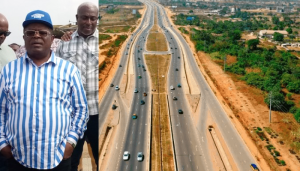 The Federal Government has confirmed its commitment to providing compensation to property owners along the proposed 700km Lagos-Calabar Coastal Highway, which will pass through nine states.
The Federal Government has confirmed its commitment to providing compensation to property owners along the proposed 700km Lagos-Calabar Coastal Highway, which will pass through nine states.
President Bola Tinubu has approved the compensation scheme, and the Minister of Works, David Umahi, has outlined the necessary requirements for affected residents to qualify for compensation.
Umahi clarified that the construction of the Lagos-Calabar coastal Highway is estimated to cost approximately N15.36 trillion or N4.39 billion per kilometer. The government has extended the eviction notice for property owners affected by this ambitious project, which is expected to be completed within eight years.
The Lagos-Calabar coastal highway will connect Lagos to Cross River, passing through the coastal states of Ogun, Ondo, Delta, Edo, Bayelsa, Rivers, and Akwa Ibom before reaching its final destination in Cross River.
During a stakeholders meeting in Lagos, Umahi emphasized that compensation would be provided to deserving individuals based on approved documents. He stated that an environmental impact assessment valuation has been conducted on the affected buildings, and compensation will not be granted to owners of shanties and illegal structures. The government aims to prioritize compensation for legitimate property owners.
Umahi also mentioned that the decision to implement a compensation plan was driven by the prevailing hardship in the country. He assured the attendees that the government would remove shanties and illegal buildings to clear the project’s path.
Regarding project funding, Umahi clarified that the Lagos-Calabar coastal highway was awarded on a counter-funding basis, not through a Public-Private Partnership. The government will provide a negotiated counterpart funding of between 15 and 30 percent. Umahi emphasized the government’s commitment to cost-effective measures and prudent financial management.
The Federal Executive Council has already approved the construction of the first phase of the Lagos-Calabar Coastal Highway, which stretches for 47.47km from Lagos. Umahi explained that the cost per kilometer is higher than the earlier estimated N4 billion due to factors such as sand filling. Nonetheless, Umahi expressed pride in the project’s cost efficiency.
The Nigerian Society of Engineers (NSE) voiced its support for the project, urging Nigerians to consider its potential investment value rather than focusing solely on the perceived high pricing. Hassan Saidu, the President of the Nigerian Highway Infrastructure and Transport Engineers (NHITE), a division of the NSE, commended the government for undertaking the construction of the road after previous administrations failed to do so. Saidu emphasized the importance of infrastructure development for economic growth and encouraged a broader perspective on the project’s cost.
In terms of future tolling, the Federal Government indicated that vehicles using the completed Lagos-Calabar coastal road would likely be charged an average toll fee of N3,000. Minister Umahi stated that the investment would be recovered within 15 years, considering an estimated average of 50,000 vehicles passing through the toll points daily. The toll gates will be equipped with security measures, and additional facilities such as restaurants, filling stations, and parking lots are planned for the convenience of road users.
Former Vice President and 2023 presidential candidate of the People’s Democratic Party (PDP), Atiku Abubakar, questioned the due process followed in awarding the Lagos-Calabar Highway Project and called for transparency regarding the total project cost.

